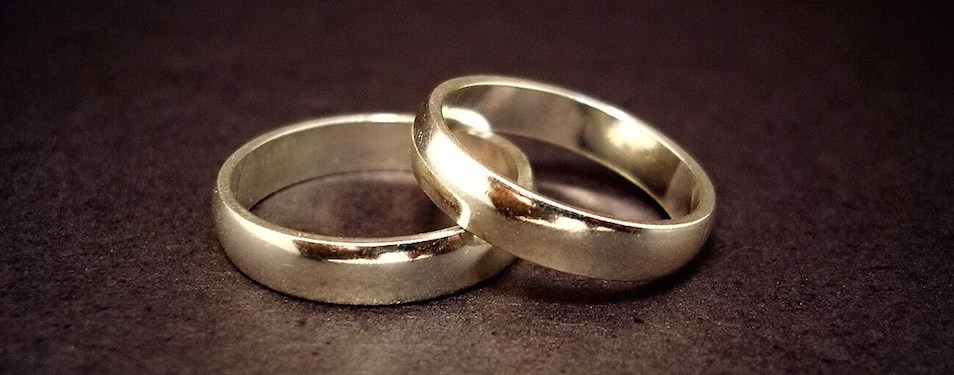
Plain gold wedding bands by Jeff Belmonte (CC BY 2.0)
What comes to mind when you think of marriage? Is it “and they lived happily ever after?” Do you picture a perfect mate? Is it “wuv twu wuv?” Perhaps you view it as an unnecessary institution that restricts your freedom.
I don’t know what comes to your mind when you think of marriage. I don’t know how you picture it or how you feel about it but what I do know is that Scripture tells us what marriage is.
Paul, in Ephesians 5:32, proclaims that marriage is a picture of Christ’s relationship to his bride the church. So, marriage should show the world what the relationship between Christ and the church is like. It should depict for others the nature of this relationship. That being the case, it would be time well spent to briefly consider the relationship between Christ and his bride.
The first thing to consider is Christ’s attitude toward his bride. He loves her.
What an eloquent expression! He loved her in spite of her unworthiness, He loved her in spite of her deficiencies. Notice what he has to do for her. She needs to be washed, she needs to be cleansed. He saw her in her rags, in her wildness; but He loved her. That is the height of the doctrine of salvation. He loved us, not because of anything in us; He loved us in spite of what was in us, ‘while we were yet sinners’. He loved the ungodly, ‘while we were yet enemies’. In all our unworthiness and vileness He loved us. He loved the church, not because she was glorious and beautiful—no, but that He might make her such.
D. Martyn Lloyd-Jones
This attitude, is the attitude of Christ toward his bride. It is one of love. It is one that is not earned or deserved but freely given by the sovereign Creator of the universe to his bride. It is a settled disposition of setting one’s affections on another and considering the other’s well-being above your own. It is an attitude that says “what can I give?” not “what can I get?”
Christ’s answer to the question “What can I give?” is Himself. Christ literally gives himself on the cross for the sake of his bride. For Christ, this answer was not a hypothetical. He did not merely talk about giving himself for his bride. He actually did it. Philippians 2:5-8 is a wonderful summary of Christ’s giving of himself. . . .
Have this mind among yourselves, which is yours in Christ Jesus, who, though he was in the form of God, did not count equality with God a thing to be grasped, but made himself nothing, taking the form of a servant, being born in the likeness of men. And being found in human form, he humbled himself by becoming obedient to the point of death, even death on a cross.
I think D. Martyn Lloyd Jones does an excellent job of capturing the essence of this passage so rather than comment myself I will quote him at length.
What does that mean? It means that that is how Christ loved the church, and gave Himself for it. He did not consider Himself. That is the first point. ‘He thought it not robbery to be equal with God’; which means that He did not regard His equality with God as a prize to be held on to. He was the eternal Son of God, He had been sharing that glory with His Father and the Holy Spirit from all eternity, but He did not hold on to that and say, ‘Why should I go to earth, why should I lay aside the signs of My glory, why should I go down and be buffeted and spat upon?’ No! ‘He thought it not robbery to be equal to God’, He did not regard it as something which He must hold on to at all costs because it was His by right. Instead, ‘He made Himself of no reputation.’ There was no need for Him to do so; there was no compulsion at all apart from the compulsion of love. If the Lord Jesus Christ had considered Himself, if He had considered His own eternal glory and dignity, there would never have been a church at all. He was the One through whom all things had been created; all the angels worshipped Him, and all the great powers and principalities did their obeisance to Him. They worshipped Him as the son and glorified Him. What if He had said, ‘O, I cannot, I cannot put any of that aside; I must have this respect that is due to me, I must have my position.’ He did the exact opposite, ‘He made Himself of no reputation’, He was born as a babe in the likeness, the form, of a man. Not only that, He even became a servant. He did not think of Himself at all. If He had done so, none of us would have been saved, and there would be no church. He did not talk about His rights; He did not talk about His dues; He did not say ‘Why should I suffer, why must I humble myself?’ He did not consider the cost, He did not consider the shame. He knew what was to be involved, He knew that He would be buffeted by those Pharisees and Scribes and Sadducees and Doctors of the Law, that people would jeer at Him, and throw stones at Him, and spit upon Him—He knew that all that was to come though He had not done anything to deserve it. Why then did he do it? For the church; because of His love for the Church. ‘He humbled Himself and made Himself of no reputation’. He had but one thought, that was the good of the church, the body that was to become His Bride. He was buying her, purchasing her, thinking of nobody but her. Not Himself, but her! . . . . Our Lord did that for us, for the church, while we were yet sinners, while we were ungodly, while we were enemies.
This my friends is the love that is to be found in your marriage. It is a love that is characterized by sacrifice for the benefit of another. It is not mere sentimentality but actual giving of yourself to another and for another. It is giving to another for their benefit with absolutely no thought of what you might receive in return.
Does this fit your picture of marriage?
By His Grace Alone,
Josh
